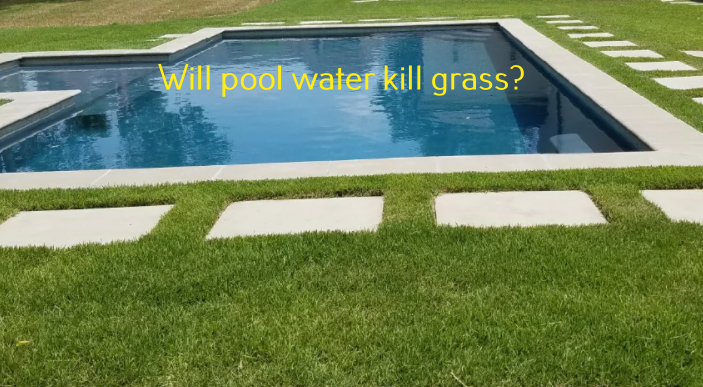Pool water is usually treated with chlorine to contain bacteria, algae, and other dirt contaminations. With all the splashing, dripping swim trunks, and gameplays, pool water will definitely mix with the lawn grass. So, will pool water kill grass?
The answer is no: Splashes and small amounts of pool water will not kill your lawn grass. Chlorine in pool water can only harm your grass and other landscape plants if excess chlorinated water drains and flood a yard.

Will swimming pool water kill my grass?
During sunny days, a pool becomes a great place to relax as you also cool yourself. We all know that a combination of a swimming pool and lawn forms a spectacular feature in a backyard. There is great fear that the pool water might kill your lawn when swimming. Let’s get to the base of this matter:
It is not far from the truth; pool water can kill your grass due to chlorine and other salts. The good news is that splashes of pool water and few drips are unlikely to kill your lawn grass. The available amount of diluted chlorine is not strong enough to cause significant damage to a lawn.
In high concentrations, the chlorine will definitely kill grass and other plants it comes into contact with. Apart from denaturing plant tissues, the chemical element may also affect the pH balance of the soil, which will affect the growth of grass or any other plant.
Pools located in coastal regions usually contain a high amount of salt. Saltwater can have a damaging effect on plants. In high concentrations, salt will kill grass and other plants by causing an osmotic imbalance in the cells. This is why you can use salt for controlling weeds in hardscapes.
Apart from the chemical effects of pool water on your grass, an inflatable pool may kill your grass if placed on the lawn. We all agree that inflatable pools are very affordable, easy to set up, and portable. But due to the nature of its material and water weight, your grass will suffer.
Inflatable pools block sunlight and suffocate the grass under them. The grass will turn brown and become dormant in a day or two. If the stay is prolonged, the grass will eventually die, and you will not be able to revive it. The dead grass spot will need to be reseeded or redesigned for other use.
How to keep a pool from killing your grass
We have seen that swimming pool water can only kill your grass when a large amount of chlorinated water can be allowed to drain and flood your lawn. An inflatable pool may also kill the grass by blocking the affected area’s sunlight, air, and water. Let’s look at ways to prevent a pool from killing your grass.
- Avoid watering your grass or garden plants with pool water. Do not attempt this even if there is no other nearby water source.
- Before draining your pool, ensure that your water is chlorine neutral, has a neutral pH, and doesn’t have high traces of other chemicals and salts.
- Drain your pool in a nearby sanitary sewer line during regular maintenance. Do not drain it in your yard or lawn.
- When chlorinating your pool, ensure you are adding the right amount of chemicals to avoid levels that can be harmful to the plants around you.
- Grow salt-tolerant grass around your pool. Bermuda grass and Zoysiagrasses can handle heavy traffic and salt conditions and will likely grow back after any damage.
- Avoid leaving your unclean pool gear on your lawn to avoid chlorinated water dripping on your grass. The items may also cause heat stress to your grass.
- Avoid setting up an inflatable pool directly on your grass. Consider areas like driveways or patios, or decks.
- Do not let your inflatable pool overstay in one spot for more than a day. Keep moving it to different spots on your lawn if you want your grass to survive.
How to repair a lawn damaged by a pool
If you see damage from chlorine or salt water, thoroughly water the area to dilute further and flush the salt or chemicals from the area. Even without noticing any damage, it is recommended that you irrigate your lawn, especially around the pool, after any gameplays.
Deep watering can also help revive a lawn damaged by heat and suffocation from an inflatable above-the-ground swimming pool. Even without any sign of damage, irrigate your grass once you relocate the pool to a different spot. Water helps plants in overcoming most forms of stress.
Ensure no weeds are taking over the affected area. Weeds tend to take advantage when the grass has been weakened. Pull all the weeds, mow and fertilize the dormant grass. Reduce the foot traffic in the affected area, and your grass will thrive healthily quickly. If the grass is dead, then consider reseeding the area.
Also read: Can you grow grass between pavers?
Final Thoughts
The grass is always beautiful around a swimming pool. Unlike a hardscape, a lawn will keep the area cool and attractive. A few water splashes and drips from swim trunks will mix with your grass when swimming. There is nothing to worry about, especially as the chlorinated water will not affect your grass.
Heat and stress from an inflatable pool are a great threat to your lawn grass. If this is what you have in your yard, keep moving it to a new spot every other day. In either case, thoroughly water your lawn to reverse any damage caused. If you dint act quickly, then prepare to reseed your lawn.
References
- Iowa State University Extension: Chlorine Toxicity
- Colorado State University: Impact of Watering Lawns and Gardens with Chlorinated Water
- Washington DC Government: How to Drain Your Swimming Pool Properly